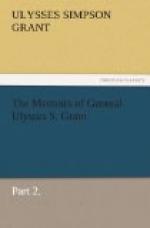I had no orders which contemplated an attack by the National troops, nor did I intend anything of the kind when I started out from Cairo; but after we started I saw that the officers and men were elated at the prospect of at last having the opportunity of doing what they had volunteered to do—fight the enemies of their country. I did not see how I could maintain discipline, or retain the confidence of my command, if we should return to Cairo without an effort to do something. Columbus, besides being strongly fortified, contained a garrison much more numerous than the force I had with me. It would not do, therefore, to attack that point. About two o’clock on the morning of the 7th, I learned that the enemy was crossing troops from Columbus to the west bank to be dispatched, presumably, after Oglesby. I knew there was a small camp of Confederates at Belmont, immediately opposite Columbus, and I speedily resolved to push down the river, land on the Missouri side, capture Belmont, break up the camp and return. Accordingly, the pickets above Columbus were drawn in at once, and about daylight the boats moved out from shore. In an hour we were debarking on the west bank of the Mississippi, just out of range of the batteries at Columbus.
The ground on the west shore of the river, opposite Columbus, is low and in places marshy and cut up with sloughs. The soil is rich and the timber large and heavy. There were some small clearings between Belmont and the point where we landed, but most of the country was covered with the native forests. We landed in front of a cornfield. When the debarkation commenced, I took a regiment down the river




